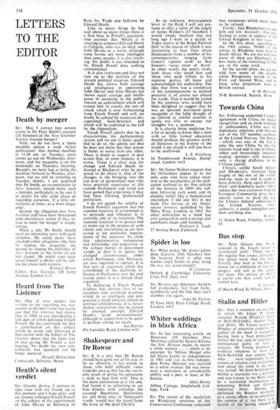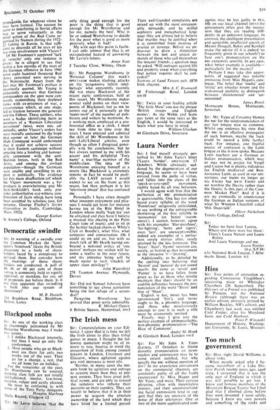Stalin and Hitler
Sir: May I comment on the letter in which Mr Edgar P. Young criticises Ronald Hingley's review of Strik-Strikfeldt's Against Stalin and Hitler. Mr Young accuses Dr Hingley of excessive credulity. the author of the book is accused of having been a Nazi propaeandist before the war, and its translator 0 pronounced guilty of lack et veracity. Mr Young produces no evidence whatever to show that Strik-Strikfeldt was among those who . . . 'were responsible for the stream of calumny and misinforma- tion about the USSR in the inter war period'. Mr Strik-Strikfeldt was neither a journalist nor a diplomat and was known in the Baltic states as a successful businessman re- -presenting British and German industrial firms. Having 5x" perienced the Russian revolution as a young officer, he no doubt had his opinion of it, but there is n.0 record of his having enpged in propaganda for whatever 'views he may have formed. The nearest he came to interfering in Soviet affairs was to serve voluntarily in the relief action of the Red Cross or- ganised by Nansen during the 1922- 23 famine in Russia. Is that suffi- cient to discredit all he says of his war-time involvement with Vlasov?
Of Mr Footman's supposed lack of veracity' only one instance is given: he is alleged to say that within a few months of the start of the German offensive in June 1941 some eight hundred thousand Red Army personnel were serving in the Wehrmacht. Apart from the fact that Mr Footman's preface is incorrectly quoted, Mr Young is apparently unaware that German commanders on the spot were con- stantly replenishing their depleted ranks with ex-prisoners of war, a circumstance which, at one stage, led to friction between the generals and the Ftihrer. These soldiers, who wore a badge identifying them as members of a 'Russian Liberation movement' (Ron), were not, ad- mittedly, under Vlasov's orders but were morally sustained by the hope that.sooner or later the German High Command would understand that it could not achieve success in their Eastern campaign without entering into a binding and honour- able agreement with the anti- Stalinist forces, both in the Red Army, and among the civilian population—though the Germans were unable and unwilling to ex- ploit it politically. The evidence for this mass disaffection (of which the Vlasov movement was a by- product) is overwhelming and Mr Strik-Strikfeldt's book only pro- vides authoritative eye-witness con- firmation of facts which have long been accepted by scholars (see, for instance, George Fischer's Soviet Opposition to Stalin. Cambridge, Mass. 1952).











































 Previous page
Previous page